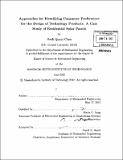Approaches for identifying consumer preferences for the design of technology products : a case study of residential solar panels
Author(s)
Chen, Heidi Qianyi
DownloadFull printable version (6.645Mb)
Other Contributors
Massachusetts Institute of Technology. Dept. of Mechanical Engineering.
Advisor
Maria C. Yang.
Terms of use
Metadata
Show full item recordAbstract
This thesis investigates ways to obtain consumer preferences for technology products to help designers identify the key attributes that contribute to a product's market success. A case study of residential solar PV panels is conducted in the context of the California, USA market within the 2007-2011 time span. First, interviews are conducted with solar panel installers to gain a better understanding of the solar industry. Second, a revealed preference method is implemented using actual market data and technical specifications to extract preferences. The approach is explored with three machine learning methods: Artificial Neural Networks, Random Forest decision trees, and Gradient Boosted regression. Finally, a stated preference self-explicated survey is conducted, and the results using the two methods compared. Three common critical attributes are identified from a pool of 34 technical attributes: power warranty, panel efficiency, and time on market. From the survey, additional non-technical attributes are identified: panel manufacturer's reputation, name recognition, and aesthetics. The work shows that a combination of revealed and stated preference methods may be valuable for identifying both technical and non-technical attributes to guide design priorities.
Description
Thesis (S.M.)--Massachusetts Institute of Technology, Dept. of Mechanical Engineering, 2012. Cataloged from PDF version of thesis. Includes bibliographical references (p. 91-94).
Date issued
2012Department
Massachusetts Institute of Technology. Department of Mechanical EngineeringPublisher
Massachusetts Institute of Technology
Keywords
Mechanical Engineering.